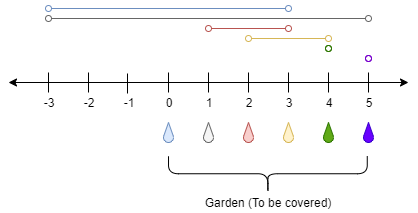There is a one-dimensional garden on the x-axis. The garden starts at the point 0 and ends at the point n. (i.e The length of the garden is n).
There are n + 1 taps located at points [0, 1, ..., n] in the garden.
Given an integer n and an integer array ranges of length n + 1 where ranges[i] (0-indexed) means the i-th tap can water the area [i - ranges[i], i + ranges[i]] if it was open.
Return the minimum number of taps that should be open to water the whole garden, If the garden cannot be watered return -1.
Example 1:
Input: n = 5, ranges = [3,4,1,1,0,0] Output: 1 Explanation: The tap at point 0 can cover the interval [-3,3] The tap at point 1 can cover the interval [-3,5] The tap at point 2 can cover the interval [1,3] The tap at point 3 can cover the interval [2,4] The tap at point 4 can cover the interval [4,4] The tap at point 5 can cover the interval [5,5] Opening Only the second tap will water the whole garden [0,5]
Example 2:
Input: n = 3, ranges = [0,0,0,0] Output: -1 Explanation: Even if you activate all the four taps you cannot water the whole garden.
Constraints:
1 <= n <= 104ranges.length == n + 10 <= ranges[i] <= 100
class Solution:
def minTaps(self, n: int, ranges: List[int]) -> int:
last = [0] * (n + 1)
for i, v in enumerate(ranges):
l, r = max(0, i - v), min(n, i + v)
last[l] = max(last[l], r)
ans = mx = pre = 0
for i in range(n):
mx = max(mx, last[i])
if mx <= i:
return -1
if pre == i:
ans += 1
pre = mx
return ansclass Solution {
public int minTaps(int n, int[] ranges) {
int[] last = new int[n + 1];
for (int i = 0; i < n + 1; ++i) {
int v = ranges[i];
int l = Math.max(0, i - v), r = Math.min(n, i + v);
last[l] = Math.max(last[l], r);
}
int ans = 0, mx = 0, pre = 0;
for (int i = 0; i < n; ++i) {
mx = Math.max(mx, last[i]);
if (mx <= i) {
return -1;
}
if (pre == i) {
++ans;
pre = mx;
}
}
return ans;
}
}class Solution {
public:
int minTaps(int n, vector<int>& ranges) {
vector<int> last(n + 1);
for (int i = 0; i < n + 1; ++i) {
int v = ranges[i];
int l = max(0, i - v), r = min(n, i + v);
last[l] = max(last[l], r);
}
int ans = 0, mx = 0, pre = 0;
for (int i = 0; i < n; ++i) {
mx = max(mx, last[i]);
if (mx <= i) {
return -1;
}
if (pre == i) {
++ans;
pre = mx;
}
}
return ans;
}
};func minTaps(n int, ranges []int) int {
last := make([]int, n+1)
for i, v := range ranges {
l, r := max(0, i-v), min(n, i+v)
last[l] = max(last[l], r)
}
ans, mx, pre := 0, 0, 0
for i := 0; i < n; i++ {
mx = max(mx, last[i])
if mx <= i {
return -1
}
if pre == i {
ans++
pre = mx
}
}
return ans
}
func max(a, b int) int {
if a > b {
return a
}
return b
}
func min(a, b int) int {
if a < b {
return a
}
return b
}
